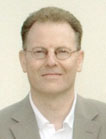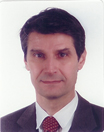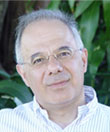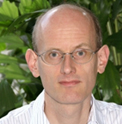 |
|
|
|
|
| |
|
|
| |
|
|
| |
|
|
| |
Keynote lectures are plenary sessions which are scheduled for taking about 45 minutes + 10 minutes for questions. |
|
|
|
|
| |
Keynote Speakers List:
- Colin Atkinson, Mannheim University, Germany
Title: Search-Driven Software Engineering
- Dimitri Konstantas, University of Geneva, Switzerland
Title: User Defined Geo-Referenced Information Management
- Michael Papazoglou, University of Tilburg, The Netherlands
Title: What's in a service?
- Alexander Verbraeck, Delft University of Technology, The Netherlands
Title: Service-Oriented Modeling and Simulation: Applications in Traffic Management |
|
|
|
|
|
| |
|
|
|
|
|
|
|
|
|
|
|
|
|
|
|
|
|
|
|
|
|
| Keynote Lecture 1 |
| Search-Driven Software Engineering |
 |
|
Colin Atkinson,
Mannheim University,
Germany |
| |
|
|
|
Brief Bio
Colin Atkinson holds the chair of Software Engineering at the University of Mannheim and is joint leader of its interdisciplinary Mobile Business research group. Before that he held a joint position as a professor at the University of Kaiserslautern and a project leader at the affiliated Fraunhofer Institute for Experimental Software Engineering . From 1991 until 1997 he was an Assistant Professor of Software Engineering at the University of Houston - Clear Lake. His research interests are focused on the use of advanced software engineering approaches, such as model driven development, service-oriented architectures and product line engineering, in the development of dependable computing systems. He received his Ph.D. and M.Sc. in computer science from Imperial College, London, in 1990 and 1985 respectively, and received his B.Sc . in Mathematical Physics from the University of Nottingham 1983.
Abstract: Although the use of web services and component technologies is becoming widespread, and more software is freely accessible on the Internet than ever before, there has been little change in levels of software reuse. Most applications are still created by integrating in-house legacy software and self-developed modules, rather than by assembling third party components/services, despite the fact that in many development situations, perfectly suitable software components are available on the Internet. The main barrier to third party software reuse, whether it be of program modules, web services or more complex components, is still the overhead involved in finding software that is "fit for purpose". Most developers still feel that the "build" option is more cost effective that the "find" or "buy" option. However, this balance has started to change in the last few years with the advent of a new generation of code search engines. Not only do these engines index far more components than was possible before, but they make it much easier to find software that meet a particular need. They also make it possible to consider component reuse during early stages of development such as modelling and design. In this talk Colin Atkinson will introduce some of the key features of the latest generation of code search engines and will explain how software engineering practices can be enhanced by integrating code search into the development process. |
|
|
| |
|
|
|
|
|
|
|
| |
|
|
|
| |
|
|
|
| Keynote Lecture 2 |
| User Defined Geo-Referenced Information Management |
 |
|
Dimitri Konstantas,
University of Geneva,
Switzerland |
| |
|
|
|
Brief Bio
Dimitri Konstantas is Prof. and Vice-Dean at the Faculty of Social and
Economic Sciences of the University of Geneva (CH), department of
Information Systems, heading the Advanced Systems Group (ASG). He was
previously professor and Chair of the APS group at the University of
Twente, assistant prof. at the University of Geneva and research
collaborator at the Institute of Computer Science at FORTH (Crete,
Greece). He has served as consultant to difference European companies,
and acts as scientific expert for the European commission, the Dutch,
Canadian and USA national research foundations, having also served as
expert for the Greek, and Luxembourg governments.
For the last 20 years, prof. Konstantas, is active in research in the
areas of Object Oriented systems, agent technologies, Multimedia
applications and e-commerce services, with numerous publications in
international conferences, journals, books and book chapters and a long
participation and leadership since 1985 in many European projects. Since
2002 his main research and work areas are mobile and wireless multimedia
applications and services, including mobile health and location based
services.
Prof. Konstantas is member of the e-Mobility ETP, founding member of the
ERCIM e-mobility WG, member of the Ericsson Think-Tank, as well as
different scientific associations including IEEE and ACM.
Abstract:
During the last few years mobile devices, like phones and PDAs, became a
standard accessory for more than 80% of the population of industrialised
countries. This expansion in use of mobile devices gave rise to the
creation of a multitude of new services and applications, allowing users
to access, exchange and create information of different forms (from text
to video and audio). Recently geo-localisation hardware (that is GPS and
Galileo receivers) started being integrated into mobile phones and PDAs,
adding a new dimension to the abstract information of the cyberspace.
With integrated geo-localization hardware, information can be physically
located in a well defined location.This new spatial dimension of information, combined with the ability of
the users to create and disseminate content, creates a new area for the
development of collaborative spatially oriented services and
applications. Users in the future will be able to create information
linked to a spatial location and leave it there for other users to “read”, as it was done in the past with signs placed by trekkers in
difficult paths. However with the new technological abilities of the
users, these tags will no longer be physical but virtual, linked to a
location and stored in the cyberspace. These /virtual tags/, as we call
them, being the product of individuals will pose new challenges for the
information consumers. Can this information be trusted? Is it still
actual? What is the confidence we give the author of the information?
What types of new information can we anticipate? what new services can
we offer and what are the main challenges? This type of questions will
eventually need to be addressed, if we the user defined spatial
information is to be of any real use to the information consumers. |
| |
|
|
|
| |
|
|
|
| |
|
|
|
| |
|
|
|
| Keynote Lecture 3 |
| What's in a service? |
 |
|
Michael Papazoglou,
University of Tilburg,
The Netherlands
|
| |
|
|
|
Brief Bio
Michael P. Papazoglou holds the chair of Computer Science and is
director of the INFOLAB at the Univ. of Tilburg in the Netherlands. He
is also an honorary professor at the University of Trento in Italy.
Prior to this he was full Professor and head of School of Information
Systems at the Queensland Univ. of Technology (QUT) in Brisbane
Australia (1991-1996). He also held senior academic positions at the
Australian National University, University of Koblenz, Germany, Fern
Universitaet Hagen, Germany, and was principal research scientist at the
National German Research Centre for Computer Science (GMD) in St.
Augustin from (1983-1989). Papazoglou serves on several international
committees and on the editorial board of nine international scientific
journals and is co-editor in charge of the MIT book series on
Information Systems. He has chaired numerous well-known international
scientific conferences in Computer Science. These include the Int.l
Conf. on Data Engineering (ICDE), Int.l Conf. on Distributed Computing
Systems (ICDCS), Int.l Conf. on Digital Libraries (ICDL), Int.l Conf. on
Cooperative Information Systems (CoopIS), Int.l Conf. on
Entity/Relationship Modelling and others. He is the founder of the Int.l
Conf. on Cooperative Information Systems (CoopIS) and more recently of
the Int.l Conf. on Service Oriented Computing (ICSOC). Papazoglou has
authored/edited fifteen books and approximately hundred and fifty
scientific journal articles and refereed conference papers. His most two
recent books are "e-Business: Organizational and Technical Foundations"
published by J. Wiley 2006, and "Principles and Foundations of Web
Services: An Holistic View" to be published by Addison-Wesley in mid
2006. His research was/is funded by the European Commission, the
Australian Research Council, the Japanese Society for the Promotion of
Science, and Departments of Science and Technology in Europe and
Australia. He is a golden core member and a distinguished visitor of the
Institute of Electrical & Electronics Engineers (IEEE) Computer Science
section.
Abstract: Automated services help enterprises create new value from reuse of
software and resources and achieve new levels of agility through greater
flexibility and lower cost structures. As services come in many flavors and
guises they have differing characteristics. In this paper we describe
the most
necessary aspects and features of automated services. We also focus on the
interplay of SOAs and Business Process Management technologies and argue
that the key enablers for Service Oriented Architectures (SOAs) should focus
on four inter-related elements: engineering and planning the SOA, SOA
implementation, SOA management and monitoring and SOA governance. |
| |
|
|
|
| |
|
|
|
| |
|
|
|
| |
|
|
|
| Keynote Lecture 4 |
| Service-Oriented Modeling and Simulation: Applications in Traffic Management |
 |
|
Alexander Verbraeck,
Delft University of Technology,
The Netherlands
|
| |
|
|
|
Brief Bio
Alexander Verbraeck is the chair of the Systems Engineering group as a full professor in Systems & Simulation at Delft University of Technology in The Netherlands. He has an MSc in mathematics (cum laude, 1987) and a PhD in computer science (1991) from Delft University of Technology in the Netherlands. His research focuses on complex distributed systems such as supply chains, on real-time control and emulation of equipment using simulation, on the development of generic, object oriented simulation libraries, and on the relation between simulation, gaming, and virtual reality. Alexander has been the chair of the European Board of the Society for Computer Simulation International for five years and he is a member of ACM, IEEE-CS, INFORMS, AIS, and EuroSim. His research results have been published in journals and presented at many international conferences. From January 2002, Alexander also has an appointment as part-time research professor in the R.H. Smith School of Business of the University of Maryland in the Logistics, Business, and Public Policy Department.
Abstract:
Service-orientation is slowly finding its way to the modeling and simulation field, and in the first projects, it demonstrates tremendous potentials. In the late 1990s it has been demonstrated that it is possible to prototype traffic management and control systems in simulated environments. However, due to the rigidness of existing simulation applications, it turned out to be difficult to test all kinds of control strategies and logistic interventions in a flexible and open way. Where the traditional simulation environments provide access to one user to one-model at a time, the complexity of today's traffic management situations ask for multiple users accessing multiple models at the same time. Service orientation is an excellent way to provide the needed access to the simulation models, but it asked for a complete rethinking of the way simulation applications and simulation models are being designed, built, and used. Using the open-source D-SOL simulation environment that was developed as a service-oriented, distributed technology, it has now become possible to easily link pieces of real software, emulations, and simulation models into a fully distributed modeling and testing environment. Several projects for traffic management have been carried out to develop generic test-beds for new traffic management services. Projects that will be demonstrated have answered important questions for the Port of Rotterdam, for a public tram transport company, and for road safety management.
|
| |
|
|
|
| |
|
|
|
..................................................................................................................................................................................................................................................
| |
|
|
|
Copyright ©INSTICC
Page updated on 4/03/10
| |
|
|
|
| |




